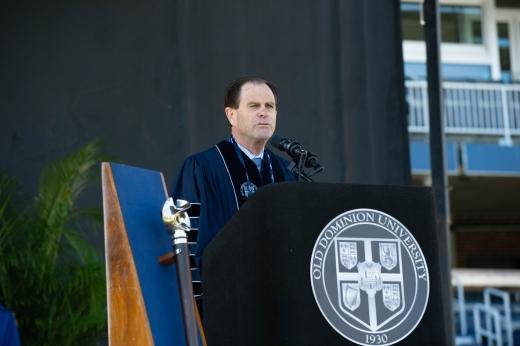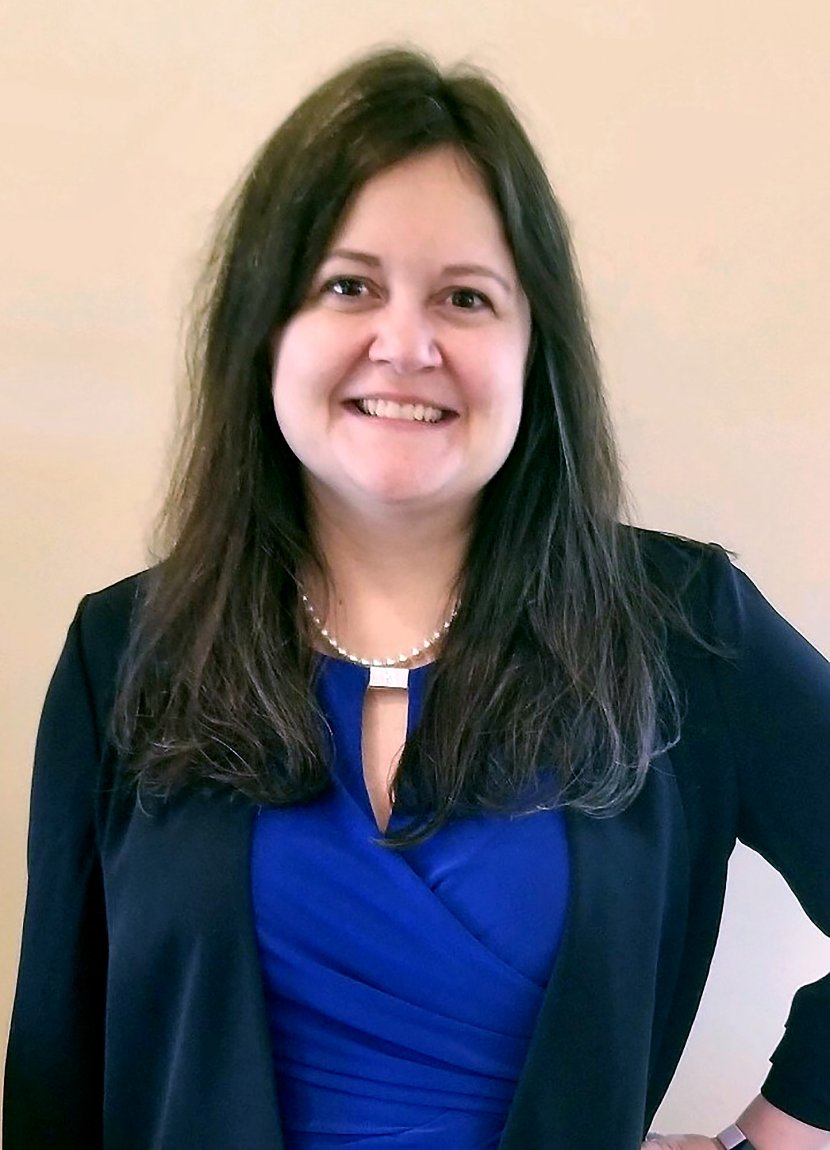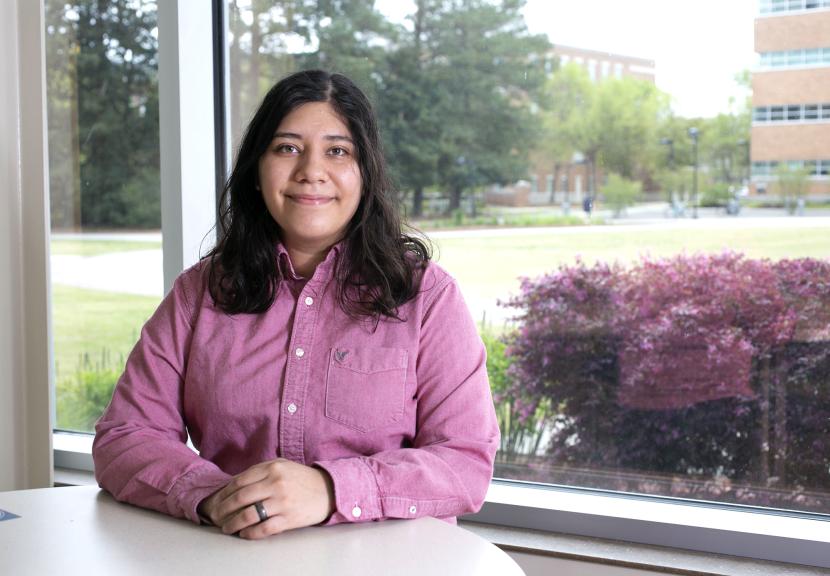By Sherry DiBari
Robert Anthony (Tony) Dice keeps a small, framed photograph on his desk. It shows a thin man with haunted eyes and a face that looked way older than his 30 years. The man is about 6-foot-1 and 130 pounds.
The image was taken two weeks before Dice entered rehabilitation for drug addiction.
"The photograph helps me to remember that it is still an option in my life," Dice said. "It helps with my own recovery."
Today, Dice bears little resemblance to that young man. At 220 pounds - most of it muscle - he looks more like Dwayne (The Rock) Johnson.
It took reaching the lowest depths and a miraculous recovery for that change to happen.
These days, Dice, a December '20 doctoral graduate in counseling from ODU's Darden College of Education & Professional Studies, is helping others to navigate the journey to sobriety and mental health.
He runs a substance abuse group for veterans, law enforcement and first responders, teaches a few classes at ODU, and works and teaches at the Farley Center, a drug rehabilitation clinic.
Dice, however, had to go through a lifetime of experiences before getting to this point.
He grew up in Horse Creek, California, a remote area near the Oregon border. He was the oldest of eight brothers and sisters, all homeschooled. Dice described his parents as "hippie Catholics."
"It was really out in the woods," he said. "We got to go out and entertain ourselves. It was a lot of rope swings and a lot of learning how to make booby traps."
When Dice was 16, his father died of cancer. Dice made the casket.
"We were burying him up on the mountain behind the house," Dice said. "And I remember all the kids were lined up and I was crying. My grandfather leaned in, he's like an old colonel in the Air Force, and he said, 'This is your family now. You are the man and men don't cry.'
"I don't think I cried for 20 years after that. That's a lot for a 16-year-old kid."
That same year, Dice ran away from home. He ended up in San Diego and got his GED. For a while, he attended Mesa College.
He thought about a career in aerospace engineering or biology.
But Dice needed something with more of an adrenaline rush.
His first real job was as an emergency medical technician with an ambulance service. "That was almost like a dream job," he said. "I got to be the hero." "Back then, that's what I needed. I needed that pat on the back."
But between calls, there was a lot of waiting.
Dice noticed the work firefighters were doing. "They had bigger turnouts and more gear and a bigger, flashier truck," he said.
So, he transferred to the Klamath River Hose Company, a fire and rescue unit.
Never content to stay still, Dice began to take a few classes in law enforcement.
His fire chief called him one day and said, "What are you doing?" Dice recalled. "I said, 'What is the hardest thing to do?' and the chief replied, 'Navy SEAL.'
"I decided instantly, I wanted to be a Navy SEAL."
He made it to the SEAL Team 2 on his first duty station.
"Those were probably some of the coolest guys I've ever met," he said. "It was just really fun, busting in doors and cracking skulls. It was really just a dream."
But there was a little more supervision than Dice expected.
"I pushed the rules a lot," he said. "Every one of those jobs: ambulance, fire and rescue, the SEALS, they all worked hard and played hard. It was a lot of alcohol, a lot of drinking."
Around his sixth year as a SEAL, Dice began experimenting with cocaine and ecstasy.
"I felt like I was a time bomb," he said. "I'd be just missing urine screens, and it just felt like something bad was going to happen."
Right about then, his reenlistment came up.
At the same time, Afghani President Hamid Karzai was hiring former SEALS for private security detail. The pay was too good to pass up.
"I punched out, went to Afghanistan and flew into Kabul," Dice said. "That job was really cool. I was finally at the top of the food chain. If you saw anybody in your way when you were driving with the president, you ran them off the road even if it was a police car.
"It was a kid-in-a-toy-store kind of feeling. We had all the cool toys, and we had no oversight and pretty much got to run the show. We made a lot of money and we played really hard. There were some real sketchy moments, but we all almost made it through."
The cash and the freedom of the job allowed Dice to do more drugs.
Near the end of his detail with Karzai, he started to lose a lot of weight. "I was playing a lot with crystal meth at the time," Dice said. His position wasn't renewed.
He stayed in the U.S. and worked as a special forces instructor and in security. "Even then, I was still using a lot and my reliability was getting kind of sketchy," he said.
Dice didn't realize it at first, but he was having trouble adjusting to life after Afghanistan.
"I would pull up to a traffic light. And I didn't like not moving. Someone would pull up next to me and I would flinch," he said.
"I wanted to go back over there (Afghanistan) so bad. Because over there when you're scared and there's a reason, you don't feel crazy. Here, I didn't know what to do."
His solution was more drugs. His health continued to decline.
One day, he finally hit rock bottom.
The daycare called Dice to pick up his son. "And I was loaded," he said. "I didn't answer the phone. They kept calling and kept calling me and I kept thinking I was going to go, but I couldn't put the pipe down. I felt my spirit crack because I turned my phone off and threw it under the bed.
"I was everyone's hero in the world, except when my son needed me. I hated myself after that. So, my use got really bad after that, almost like a death spiral."
Dice knew he needed help. "I literally opened up the phone book, put my finger down and called the first number," he said.
On July 29, 2010, Dice entered drug rehabilitation at the Farley Center in Williamsburg. "That was the last day I ever used," he said.
It was a struggle, however. "I didn't want to be there," he said. "I was just angry."
The turning point came a few days later.
Dice was sitting in a room with his group therapist, Dray Summers, and glanced out the window. "It felt like my world was a kaleidoscope and something just clicked," he said.
"I remember sitting in his (Summers') room, and thinking, 'Maybe this could work, maybe my life could be different.' It was like hope came back."
On the ninth day of rehab, Dice's insurance fell through. "I knew if I left, I would use and die," he said.
The Farley Center gave him a four-hour pass. He went to CarMax, sold his car and signed the check over to the center.
Dice said the rehab experience was transformative.
"I really got to see myself in a different light," he said. "The way I describe it, is that my therapist helped me save me from myself.
"I remember looking at him (Summers) and thinking about all the jobs I've had. ... And he had walked in the door with a cup of coffee and saved my life."
After rehab, Dice was paired with a sponsor and went through a 12-step recovery program. He described it as a "journey inward."
He enrolled at Tidewater Community College and began to think about working in human or social services.
"It was funny, because I never allowed myself to look there, because there was no money in it," Dice said. "I was only looking at things that had fighting and cool toys and fast cars."
Dice transferred to ODU for his undergraduate in human services, then master's degree in counseling.
At the Darden College, Dice is highly respected.
"Tony's deep empathy, fierce devotion and calm strength help his friends and clients alike to feel safe in being authentic," said Kristy Carlisle, assistant professor in the Department of Counseling and Human Services. "While he makes it look effortless, I see how he purposefully channels his life experiences into positivity and healing. He is a truly remarkable person and professional, an unwavering advocate and an addictions specialist who helps students and clients achieve their greatest potentials. He's an invaluable asset to ODU."
"Tony's journeys, in both his larger-than-life experiences and adventures and also his sojourn to self-awareness and healing, bear witness to his courage, curiosity, compassion, drive and diligence," added Tim Grothaus, a counseling and human services associate professor. "I admire the strength he shows daily through his humble service, authenticity, vulnerability and gratitude. I am one among many in our department and in this community who can clearly say that my life is richer because of Tony's impressive and inspiring attitude, actions and advocacy."
Dice was a natural academic, earning a 4.0 GPA from associate through master's degrees, and 3.96 as a doctoral student. In 2014, he won the Kaufman Award, the highest honor given to an ODU undergraduate.
He became fully invested in the counseling. He attended conferences and presented papers nationally and internationally. "I've been passionate about everything I've done my life, but I felt this was a calling," he said. "It was like my life had been saved at a very deep level."
Dice soon realized that the 12-step program wasn't fully understood. "There were still a lot of people back then that thought it was just a bunch of alcoholics getting together and talking about drinking, or not drinking," he said. His research, at both the masters and the doctorate level, would address those misconceptions.
On the day of his five-year anniversary, he went back to the Farley Center asked for a job. They hired him and let him do his required internships there as well.
"That was like walking on hallowed ground," he said. "I felt really at home there."
Dice, with the help of Summers, learned about the dynamics of group meetings. Once when Summers was on leave, Dice led his group.
"I was in the same room, in his seat," Dice said. "And I could see another addict sitting in the same seat I had sat in, looking out the same window.
"That was probably the most pure form of knowing you are in the right spot where you are supposed to be. I felt like this was supposed to happen, I'm supposed to be here."
In December, Dice defended his dissertation at the kitchen table - a space he had commandeered since the beginning of the pandemic - with his five children watching.
"It was pretty emotional because they had never seen me not in school," he said. "Every night, I have been sitting at the table writing and writing and writing."
Dice is continuing to write - he's working on a book that is part autobiography and part an informative read about the 12-step recovery program.
"My story is how I justify what I've been through," Dice said. "I've done a lot of shady stuff. Being an addict and alcoholic, you do a lot of stuff you're not proud of.
"The way I can live with that is if my story can help someone else, it gives meaning to what I've been through. It takes the whipping post I used to have and turns it into a guidepost for others."






